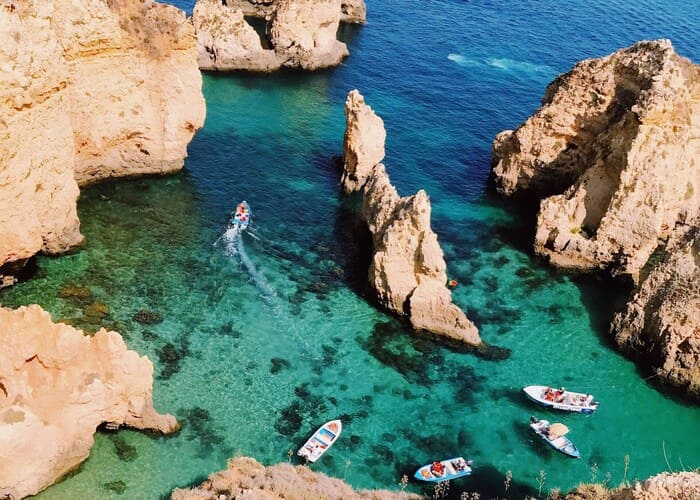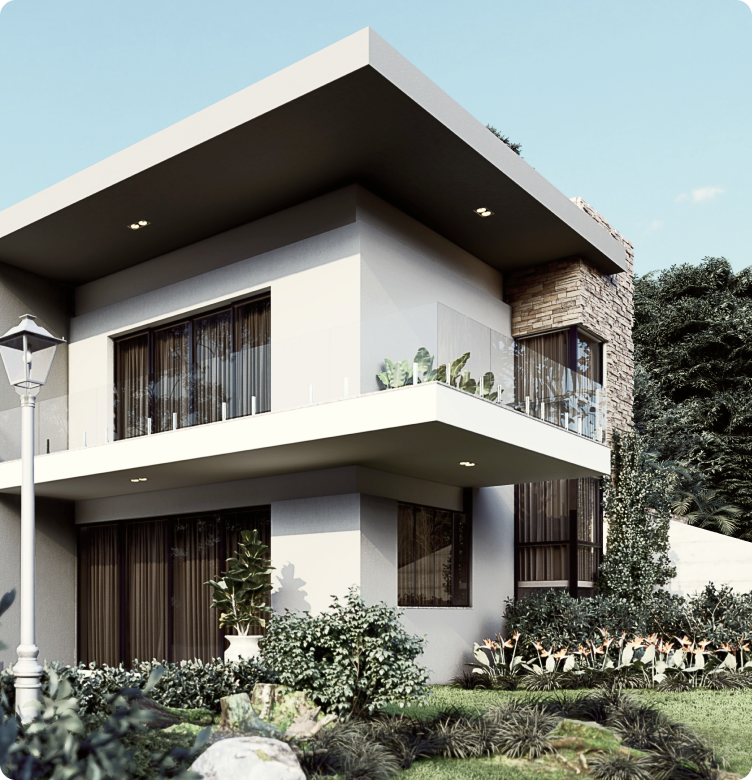The well-known Algarve region of Portugal has long been a hot topic for lifestyle buyers and investors. It boasts a pleasant climate, unique landscapes, and natural beauty that has attracted expats from all walks of life. Combined with the region’s dynamic real estate market, the Algarve is a standout location for property investors and lifestyle buyers.
Should you be considering snapping up a property in the southernmost region of Portugal, this Real Estate Investment Algarve guide has you covered, providing you with everything you need to know about securing the perfect property on Portugal’s most sought-after coastline.
Why buy property in the Algarve, Portugal?
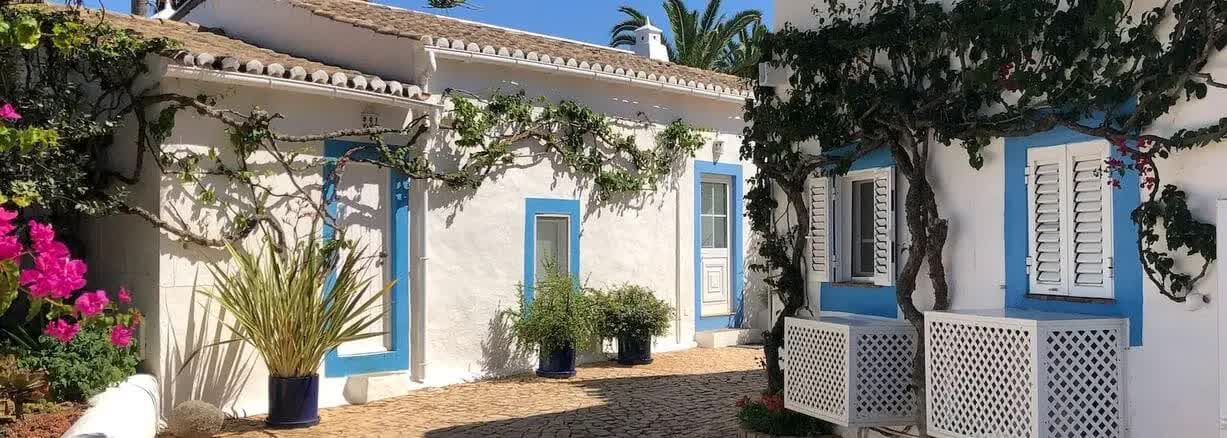
Since the 1960s, the Algarve has been attracting tourists looking to escape to a gorgeous destination with pristine beaches and blue skies. Since then, expats from all walks of life have been relocating to the region, seeking a higher quality of life and creating a booming real estate market.
The Algarve property market presents a wide range of attractive real estate options, whether you are looking for a spacious family home, a modern city apartment, a holiday home, or a luxurious investment property in one of the Algarve’s most sought-after postcodes.
With more than three hundred days of sunshine each year, excellent flight connections from Faro International Airport, located in the center of the Algarve region, and an abundance of outdoor activities to get involved in, from world-class golf courses to an array of water sports options, the Algarve is a world-renowned tourist hotspot. These factors have all caused property prices to rise, alongside property values and rental returns.
Algarve property prices
Although property prices in the Algarve vary depending on where you buy, the average asking price is €3,897 per square meter. Below, we provide you with a complete rundown of the different Algarve real estate prices in the different municipalities.
Municipality | Price (per square meter) |
Albufeira | €3,635 |
Alcoutim | €1,276 |
Aljezur | €3,346 |
Castro Marim | €6,151 |
Faro | €3,519 |
Lagoa | €3,800 |
Lagos | €4,476 |
Loulé | €5,191 |
Monchique | €2,530 |
Olhão | €3,395 |
Portimão | €3,119 |
São Brás de Alportel | €2,357 |
Silves | €3,126 |
Tavira | €3,309 |
Vila do Bispo | €4,298 |
Vila Real de Santo António | €3,343 |
Note: These are the average asking property prices. The purchase price is often significantly lower than this as the seller aims to sell their property by a set date. Note that property prices can, in certain circumstances, also be higher than this average price, although this is not as common.
Algarve Investment Opportunities
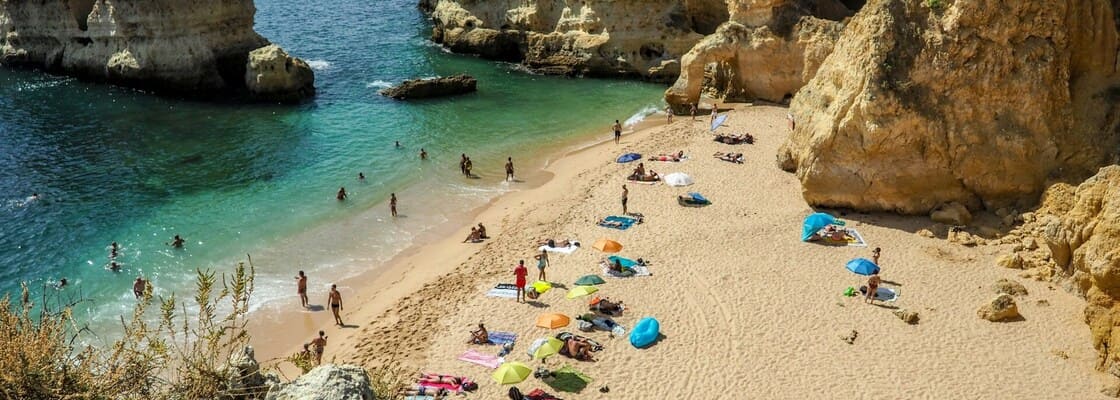
Should you be seeking property investment opportunities in the Algarve, you’ll find that it can be a very lucrative venture, given the popularity of the region. The average rental yield for the Algarve is 5.6 percent, although this will vary depending on which municipality you opt to purchase property.
Popular locations to capitalize on short-term rentals include Portimão, which hosts an array of top festivals, Lagos, the top location for water sports, and Albufeira, the bustling nightlife city that retains its historic old town, each of which comes alive in the summer months, bustling with activity. For something quieter, Tavira, in the Eastern Algarve, is the perfect spot where you can enjoy a more authentic side of the Algarve, while also being able to earn a nice return on your real estate investments.
For property investors seeking luxury properties, the Golden Triangle of Vilamoura, Vale do Lobo, and Quinta do Lago are excellent options. Lagos and Loulé are also popular locations and have some stunning luxury properties up for grabs, many of which come with stunning ocean views.
Property in Algarve Portugal: Where to invest?
One of the many strengths of the Algarve, and that has contributed to its wide appeal across all expat groups – tourists, retirees, investors, families, and young professionals – is its ability to cater to these different profiles.
While the Western Algarve is renowned for its stunning landscapes, such as the Benagil Caves and Ponte de Piedade, and is a favorite with water sports fanatics, the Eastern Algarve promises tranquillity and a more authentic atmosphere. The Central Algarve is the most popular with tourists, and you’ll find buzzing cities here, including Faro and Albufeira, alongside some of the very best beaches in Portugal, such as Paia da Galé and Praia da Marinha.
In this section, we’re going to provide you with some of the most desirable locations in the Algarve so you can better determine which destination could be well best suited to your needs and requirements.
Western Algarve
As we’ve mentioned, the Western Algarve is a favorite with water sport fanatics. You’ll find many properties here have incredible sea views and embrace modern architecture and cutting-edge design.
Lagos
The Western Algarve is well-known for its water sports activities and abundance of golf courses – there are ten golf courses in and around Lagos. For prospective investors looking for property to buy in Portugal Algarve with stunning views of the Atlantic Ocean and all the amenities they could wish for, Lagos is an appealing location. Alongside this, ever-increasing popularity as a vacation destination creates opportunities for property investments in hotels, hotel facilities, holiday rentals, and property development. Capital appreciation here could be massive in the future.
Sagres
Known for its rugged coastline, stunning beaches, and surfing culture, buying property in Sagres offers an opportunity to invest in a laid-back coastal lifestyle with a focus on outdoor activities and breathtaking ocean views. You’ll find Sagres has a nice community feel, where it is easy to get to know the locals.
Central Algarve
The Central Algarve is the best known part of the region, where you’ll find the popular cities like Albufeira and Vilamoura. Placing your money here could be a very smart investment.
Portimão
With its bustling marina and vibrant waterfront, investing in property in Portimão provides access to a dynamic urban environment complemented by beautiful beaches and a thriving cultural scene. The incredible sands of Praia da Rocha are close by, where you can enjoy those endless sun filled summer days.
This is a popular tourist location and there are many events throughout the year, so you should be able to secure a nice return on your investment by snapping up property here.
Loulé
Nestled in the scenic countryside, buying property in Loulé offers a tranquil retreat with charming cobblestone streets, traditional markets, and easy access to both coastal and inland attractions in the Algarve region. You are perfectly positioned to easily get around the Algarve here and the Faro Airport is close at hand.
Albufeira
Renowned for its lively nightlife and picturesque beaches, investing in property in Albufeira presents a great investment and an opportunity for foreign investors to capitalize on the area’s vibrant tourism industry, with a range of entertainment, dining options, and amenities for residents and visitors alike.
Vilamoura
As a luxury resort destination, buying property in Vilamoura provides access to luxury amenities such as championship golf courses, a world-class marina, and upscale dining and shopping experiences, making it an ideal choice for prospective investors seeking a high-end lifestyle. Indeed, the Vilamoura Marina has been named the International Marina of the Year multiple times by The Yacht Harbour Association (TYHA) and the British Marine Foundation.
Faro
Serving as the capital of the Algarve region, investing in property in Faro offers a blend of historic charm and modern conveniences, with its picturesque Old Town, bustling city center, and convenient access to transportation hubs. While Faro is often overlooked in favor of other locations, it is a beautiful city in its own right, blending traditional architecture with modern amenities.
Carvoeiro
With its stunning cliffs, secluded coves, and picturesque coastline, investing in property in Carvoeiro provides an opportunity to embrace a relaxed beachside lifestyle surrounded by natural beauty and a close-knit community. Carvoeiro will likely increase in popularity in the future, and you should be able to capitalize on your investment in the future.
Eastern Algarve
The Eastern Algarve is known as being the most authentic part of the Algarve, where you can enjoy the very best of nature, such as Praia do Barril and the Ilha de Tavira.
Tavira
Known for its beautiful coastline, historic architecture, and tranquil atmosphere, buying property in Tavira offers a glimpse into traditional Portuguese life, with its charming riverside setting, ancient castle, and proximity to pristine beaches and nature reserves. The white buildings with blue façades and the incredible number of churches create a sleepy, village-like feel, where the relaxed pace of life is infectious.
Other locations to consider in the Algarve
Beyond these popular destinations, other areas worth considering for property investment in the Algarve include Silves, Olhão, and Monchique, each offering its own unique charm, attractions, and investment opportunities within the region’s diverse landscape. Wherever you are located in the Algarve, you will find a wide selection of activities close at hand, from world-class golf courses (there are more than 30 in the Algarve region) to water sports.
Property Types in the Algarve
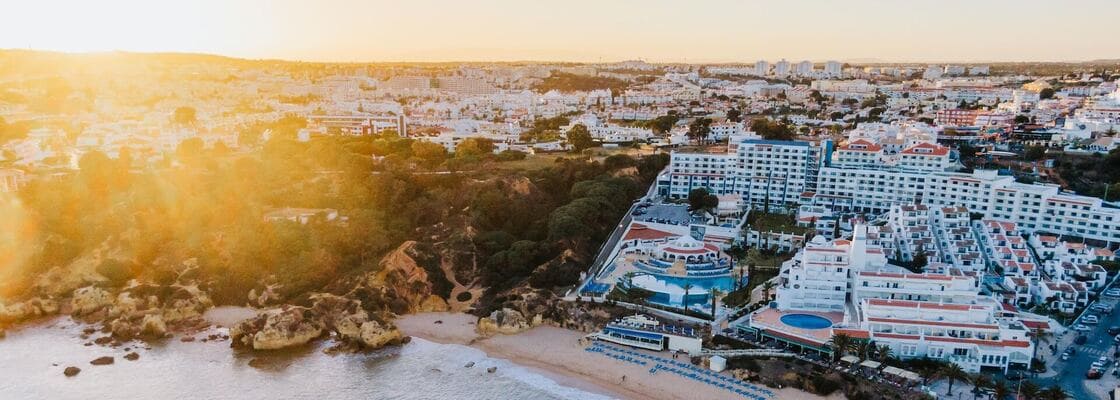
When it comes to property types in the Algarve, you’ll find a wide range of property options on the table, whether you are seeking a spacious villa or a modern apartment.
Some popular property types on the market include:
- Modern apartments
- Villas
- Country homes
- Townhouses
- Luxury Property
- Holiday homes
- Vineyards
- Land to create your dream home from scratch
Practical Information
The Algarve is one of the very best places to relocate to, as can clearly be seen by the sheer number of expats seeking out this beautiful spot in Portugal. In this section, we provide you with some key practical information about the country’s most popular region.
Climate in the Algarve
If you were to ask someone who had relocated to the Algarve the best thing about living in the region, the pleasant climate would likely be top of the list. The Algarve boasts a Mediterranean climate characterized by hot, dry summers and mild, wet winters.
With over 300 days of sunshine annually, temperatures in summer often soar above 30 Degrees C (86 Degrees F), perfect for beachgoers, while the slight breeze from the coast ensures it doesn’t get unbearably hot. Winters are pleasantly mild, rarely dropping below 10 Degrees C (50 Degrees F), making it a year-round destination for visitors.
Beaches in the Algarve
The Algarve is home to more than 100 beaches, from the incredible endless sands of Praia da Rocha in Portimão to the quieter Praia do Barril, close to Tavira, which you can get to by taking a little train in the high season. Many of the beaches also offer a wide array of water sports options, incredible restaurants where the spotlight is firmly on fresh fish and seafood, and where you will find events throughout the year.
Lifestyle and Culture in the Algarve
Should you move to the Algarve, you’ll want to embrace the relaxed pace of life. With a rich history, the region is a tapestry of cultures, from the Moorish architecture that can be seen even in the cities of Faro and Albufeira to the Medieval castles, such as Tavira Castle or Lagos Castle.
Alongside these historic points of interest, you’ll find a selection of museums in key cities and an array of festivals that take place throughout the year, spanning music, food, and local customs. Some of the most popular include the Medieval Paderne, where a medieval market materializes, the Carnival of Loulé, and the International Sand Sculpture Festival, the largest festival of its kind in the world.
Expats in the Algarve
While the Algarve has long been popular with British retirees, you’ll find expats from across the world that have settled down in the Algarve region to embrace a better quality of life, whereby more than 10 percent of the population are expats. You’ll find it easy to create a good network of friends, with countless activities on offer, making it easy to get to know fellow expats and locals.
More families are relocating to this stunning region of Portugal, due to its affordable property prices, high quality of life, and where it is possible to spend much of the year outside, perfect for family activities. Alongside this, you’ll find 12 excellent international schools in the Algarve, with a range of curricula on offer, from British to American teaching styles. Some of the top schools include the Nobel British International School, Vale Verde International School, Colegio Santiago Internacional, and the Aljezur International School.
Transport in the Algarve
Although the Algarve has good train links covering the entire region, and there are local bus links between towns, the most practical way to get around the Algarve is by car. Faro International Airport serves as a central hub, which is particularly convenient for those residing in the central Algarve. Additionally, train journeys from Faro to Lisbon typically take three to four hours, providing further accessibility to other parts of Portugal
An Overview of the Property Buying Process
Property investments in the Algarve present an alluring opportunity for investors. However, breaking down the property buying process can be tricky. Below, we present a simple step-by-step guide to buying property in the Algarve.
Step 1: Define your requirements and budget
The first step in any property purchase is to define your needs. Are you looking for a modern apartment? A swish villa with ocean views? An investment property to secure a nice return on your investment?
Also, factor in the key services that you would like to be close to. For example, if you are moving with family, consider which school could be a good option for your children and its proximity to your home. Where this the nearest restaurant? The closest supermarket? It can be a good idea to make a list of amenities you want to be close to in person and go from there.
It goes without saying that you should also define your budget, as this will help refine your property search. There are more than fifteen banks in Portugal that can assist foreign investors with financing when it comes to buying property, so be sure to check out which one offers the best property deal for your personal situation.
Step 2: Find your dream property
After you have defined your budget and requirements, start by researching the real estate market to get to grips with the types of properties on offer before seeking the assistance of a real estate agent or buyer’s agent to discuss your needs.
Be Global Properties has handpicked a selection of the finest properties in the world to cut down the hard work of you having to scour through the internet to find the perfect property.
Step 3: Make an offer
Negotiate with the seller once you’ve identified your ideal property. It’s advisable to consider enlisting the services of a real estate professional to help ensure you secure the property at the best price possible.
Step 4: Signing the Promissory Contract (CPCV)
Once your offer is accepted, the transaction is formalized through a Promissory Contract called the Contrato de Promessa de Compra e Venda (CPCV) in Portugal. This is a written agreement between the seller and the buyer and typically requires a 10 percent deposit. It is signed in the presence of a Notary.
Step 5: Signing the Escritura
The Escritura, also known as the Final Deed, is the official document that officially transfers property ownership over to the buyer. Any outstanding payments will need to be paid at this stage. Upon signing, the buyer assumes official ownership, concluding the transaction process.
Key Considerations for an Algarve Real Estate Investment
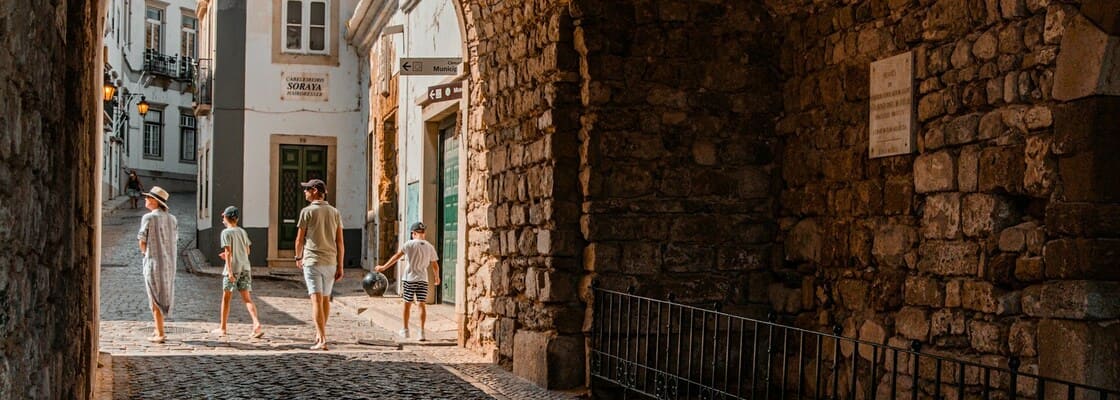
Property investments require careful consideration, and you will need to ensure you understand the Portuguese real estate market, including real estate prices and the types of property prices.
In the section below, we outline some other key consideration that you should be aware of before you buy property in the Algarve.
Due diligence
When buying property in any country, there is a fear that there will be issues with the property or the seller. To remedy this, it’s essential to conduct thorough due diligence on both.
This entails a detailed examination of the legal aspects of the property, including title deeds, permits, licenses, and potential encumbrances. Enlisting the expertise of a dedicated real estate lawyer is highly recommended and will help you navigate through the legal intricacies and uncover any potential issues. Ensuring the seller can sell, and there are no problems on this front, is also crucial to a hassle-free purchase process.
Market volatility and economic influences
When delving into the Portuguese real estate market, it’s crucial to grasp both the potential return on investment and macroeconomic factors such as inflation rates, considering the market’s volatility and economic influences.
Understanding the local market
Navigating the Portuguese real estate market can be tricky, requiring a thorough understanding of its nuances and local regulations. It’s crucial to take into account factors such as property values, shifts in supply and demand, regulatory frameworks, and current market dynamics to determine how well your potential property investment will perform in the future.
Real Estate in Algarve Portugal: Understanding Taxes
In Portugal, property taxes will fall both at the time of purchase and on an annual basis. Foreign investors will face no restrictions when buying property in Portugal and will have the same property taxes as Portuguese citizens.
In this section, we’ll provide you with a rundown of the taxes that you will need to be aware of when buying property in Portugal, both at the time of purchase and annually. We will also provide you with information on Capital Gains Tax and taxes on rental income in Portugal.
Taxes to consider at the time of purchase
Below, we show the Portuguese property taxes to consider at the time of acquisition.
IMT (Property Purchase Tax)
This tax is also referred to as property transfer tax and ranges from 0 to 10 percent. The rate between 0 and 8 percent is influenced by factors such as the property’s price, location, type, and intended use (primary residence or secondary housing). A fixed rate of 10 percent is applied to buyers associated with territories that benefit from favorable tax schemes, known as blacklisted jurisdictions.
Stamp Duty
When purchasing property in Portugal, it’s important to factor in Stamp Duty (Imposto do Selo), one of the country’s oldest taxes that is applied to various transactions. Regarding property, the stamp tax rate stands at 0.8 percent.
Taxes to pay on an annual basis
The taxes that you will need to pay after you have purchased the property on an annual basis are shown below.
IMI (Municipal Property Tax)
The Municipal Property Tax (IMI) is an annual obligation for property owners in Portugal. Each municipality determines its own rate for this municipal tax, which usually ranges from 0.3 to 0.45 percent for urban properties (increasing to 0.5 percent in some situations) and up to 0.8 percent for rural properties.
It’s worth noting that IMI is calculated based on the property tax value (VPT), not its purchase price, which often benefits buyers since the VPT is usually lower. Additionally, properties in designated rehabilitation areas undergoing works may qualify for a three-year IMI exemption, extendable to five years if the property serves as the owner’s primary residence.
Additional to AIMI
If you have a property worth more than €600,000, then you will be subject to AIMI, This is a post-purchase tax that has three different levels:
- For properties valued between €600,001 and €1 mil: 0.7 percent tax
- For properties valued between €1 mil and €2 mil: 1 percent tax
- For properties valued above €2 mil: 1.5 percent tax
Capital Gains Tax
If you would like to sell your property in Portugal, the profits that you make – the capital gains – will be liable to tax. You will need to disclose in your tax return the year when you purchased the property and the respective price that you paid for the property, in addition to the invoices of any work you had done on the property, which will be considered in the capital gains assessment.
You may be exempt from capital gains if the total selling price is reinvested into a new home in Portugal. To be exempt, the house you are selling will need to be your permanent residence, and it will have to correspond to your tax address. Additionally, the purchase of a new house and reinvesting the total selling price needs to be done 24 prior to such a sale or 36 months after the sale.
Tax on rental income
The Portuguese property market provides investors with the ability to generate rental income on their investment, whether they opt for short—or long-term rentals. It’s important to remember that there are certain differences in the process of renting property. For example, with short-term rentals, you will need to secure an Alojamento Local—or AL License—to rent out your property. Also, bear in mind that there are currently some restrictions on securing an AL license, which is needed to rent out your property in the short term.
If you intend to rent out your property, there are specific taxes to be aware of. Rental income from residential properties is taxed at 25 percent, while rental income from other types of properties is taxed at 28 percent.
The applicable tax rate, whether 25 percent or 28 percent, depends on the nature of the rental agreement. Although these rates may occasionally fluctuate slightly, they typically remain within this range.
Tips for Investing in Algarve Real Estate Portugal
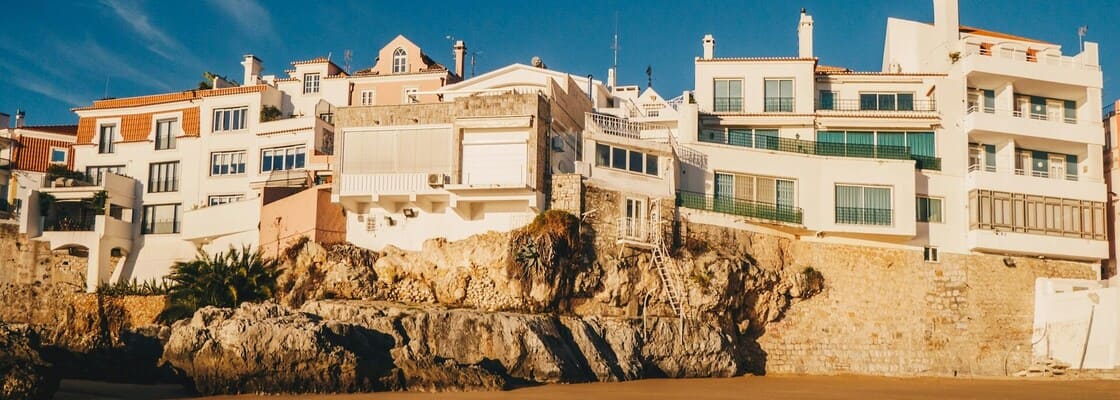
We know that property purchases in a country where you may be unfamiliar with the legal jargon, processes, and language can be difficult. Here are some tips to ensure a successful property purchase.
- Research market trends: To understand if you are making a good investment where your property will have a consistent growth in value, ensure you take time to fully understand the market, including rental yields, property values, capital appreciation, rental demand, development projects, and so on.
- Location is essential: Choosing the right location is pivotal to ensuring your property can be rented out throughout the year. Consider proximity to amenities, beaches, transportation links, and so on.
- Consult local experts: Work with local real estate agents, lawyers, and property managers who have in-depth local knowledge of the Algarve market and can provide valuable insights. We recommend seeking the assistance of a buyer’s agent, such as Goldcrest Real Estate to assist you with the buy. This is because real estate agents in Portugal work on behalf of the seller and will secure a higher commission for a higher sale. Buyer’s agents, on the other hand, work solely on behalf of the buyer.
- Consider rental potential: If you’re investing for rental income, assess the potential rental demand in different areas of the Algarve and choose properties that appeal to tourists or long-term renters. Speaking with a real estate professional will help you no end, as they will have up-to-date information on top locations based on rental yield and whether long term rentals or short term is the better option for your personal situation. They will also help you pinpoint opportunities where you are more likely to have guaranteed rental income.
- Understand legal and tax implications: Familiarize yourself with the legal and tax regulations governing property investments in Portugal, including residency requirements, property taxes, and capital gains taxes.
- Inspect properties thoroughly: Before making a purchase, conduct a comprehensive inspection of the property to identify any potential issues or maintenance needs that could affect its value or rental potential.
- Don’t rush the buy: We know that you may be concerned about missing out, but don’t be too hasty when securing property in Portugal. A buyer’s agent will be able to work out the timeline with you, so you know how to negotiate and when to present your offer.
Is now the time to buy property in the Algarve?
While there is always a level of risk with property transactions, investing in property in the Algarve in 2024 appears to be a very good investment. There is a vast array of property types to cater to diverse preferences, plus the region’s average rental yield is high, currently standing at 5.6 percent. In 2024, it is predicted that property prices in Portugal will, on average, continue to increase, heightening the market’s competitiveness and highlighting that investing now in the Algarve real estate market is a smart move.
Find Your Dream Property with BE Global

BE Global Properties is your gateway to meticulously curated properties that transcend ordinary listings. We carefully handpick the very best selection of properties to help you find your dream home or investment property.
Each of the properties on our platform tells a unique story, whether it’s effortless chic or practical living.
Contact BE Global Properties today and start your journey to find your global haven.
Frequently Asked Questions about Investing in the Algarve, Portugal Real Estate Market
Are there any international schools in the Algarve?
Yes, there are 12 international schools in the Algarve teaching a range of curricula, including British and American. Some of the best options to consider are the Nobel British International School, Vale Verde International School, Colegio Santiago Internacional, and the Aljezur International School. Over the past few years, more families than ever before have been relocating to the Algarve as they seek to pursue a better quality of life.
What is transport like in the Algarve?
Public transport is generally very good in the Algarve, with extensive train and bus links. However, if you are looking to the more remote areas, having a car with you is recommended. The Faro International Airport makes it easy for avid travelers to get around easily.
Where do expats live in the Algarve?
Expats often settle in popular towns like Lagos, Albufeira, and Faro due to amenities, community, and proximity to beaches. These areas offer a mix of coastal charm and modern conveniences.
What are the best beaches in the Algarve?
Praia da Marinha, Praia da Rocha, and Praia de Benagil are among the top-rated beaches for their stunning cliffs, clear waters, and picturesque surroundings, ideal for sunbathing and water activities. However, with more than 100 beaches to be found in the Algarve, you’ll be spoilt for choice.
How far is the Algarve from Lisbon?
The Algarve is approximately 280 kilometers (about 174 miles) south of Lisbon. Travel time by car is around 2.5 to 3 hours via the A2 motorway or by train, offering scenic views along the journey.
Are there any airports in the Algarve?
Yes, Faro Airport serves as the main international gateway to the Algarve region. It offers a range of flights to various destinations and is conveniently located for travelers exploring the area.
What areas to avoid in the Algarve?
The Algarve is generally safe, with Portugal being the seventh safest country in the world, according to the Global Peace Index. It is best to exercise caution in tourist areas, as there can be petty crime.
Is the cost of living in the Algarve expensive?
The cost of living in the Algarve can vary depending on lifestyle and location. While some areas may be pricier due to tourist demand, overall, it tends to be more affordable compared to other European destinations, especially in smaller towns.
Is the Algarve safe?
The Algarve is considered one of the safest regions in Portugal, ranking in seventh position in the Global Peace Index. Violent crime rates are low, and locals are generally friendly and welcoming to tourists and expatriates. However, exercise normal precautions, especially in crowded tourist areas.
What is the best area of the Algarve to live in?
The best area depends on individual preferences. Lagos offers a vibrant expat community and picturesque beaches and is perfect for water sports enthusiasts, while Tavira charms with its historic architecture and authenticity. Faro, Albufeira, and Portimão are also excellent locations in the Central Algarve, while the Golden Triangle of Vilamoura, Vale de Lobo, and Quinta do Lago offer exclusivity and luxury properties. Research each area’s amenities and lifestyle to find your ideal fit.
What are the best areas in the Algarve for real estate investment?
The best areas in the Algarve for real estate investment include Lagos, Sagres, and Portimão. Lagos is known for its stunning ocean views and golf courses, making it attractive for lifestyle buyers and property investors.
Sagres offers a laid-back lifestyle and a strong surfing culture. Portimão’s dynamic urban environment and beautiful beaches appeal to those seeking both residential and commercial properties. Vilamoura is renowned for its luxury amenities, including Vilamoura Golf, while Albufeira’s vibrant tourism industry ensures high returns on holiday rentals and buy-to-let properties.
Faro, Tavira, Carvoeiro, and Quinta do Lago are also popular locations for acquiring real estate. Investment opportunities include renovation projects and off-plan properties. International schools, healthcare facilities like Hospital de Faro, and picturesque beaches such as Praia da Marinha enhance tourism and lifestyle options.
Should I buy property in the Algarve or in Lisbon?
Both regions offer unique benefits. The Algarve boasts stunning coastal scenery and a relaxed lifestyle, ideal for retirees or holiday homes. Lisbon offers cultural richness, vibrant city life, and excellent investment potential. Consider your lifestyle preferences and long-term goals before deciding.
Should you be looking to invest in long-term rentals to generate a steady rental income, Lisbon may be the better option. As the capital city of Portugal, Lisbon has a high rental demand and offers high rental yields and the opportunity for a profitable investment. Over the past few years, more expats have been looking to stay for longer time periods in key areas of the Algarve, so there is also potential to secure a nice return on your investment properties.

